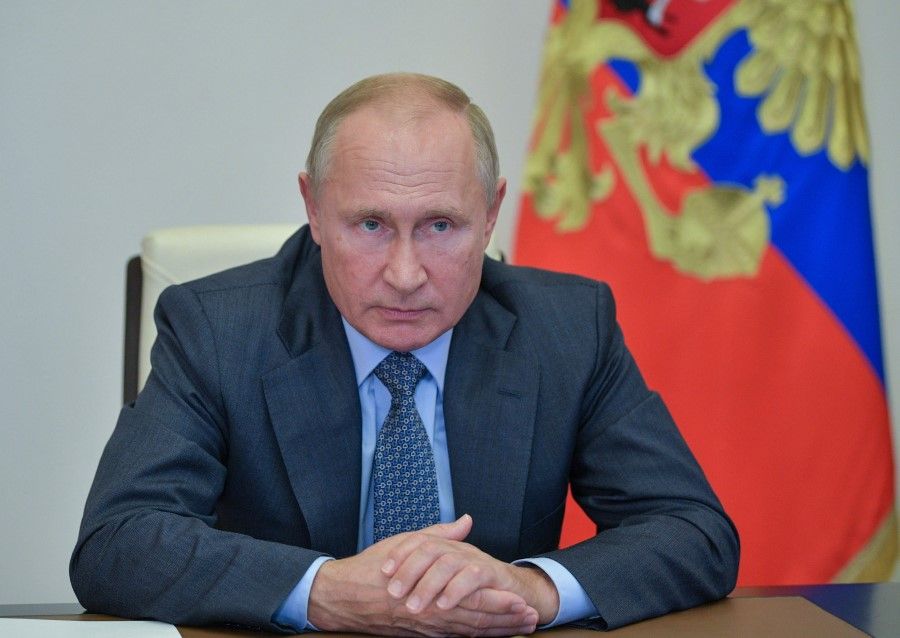Will Beijing hinder Moscow's operations in the South China Sea?
The South China Sea poses a stress test in Russia-China relations, pitting China's claims against Russian energy interests.

When foreign policy analysts discuss China-Russia relations, there are broadly two main schools of thought.
The first school of thought (the minority view) is that Russia and China have forged an alliance in all but name (Moscow and Beijing eschew the word "alliance", preferring instead to use the amorphous phrase "comprehensive strategic partnership of coordination for a new era"). Supporters of this view point to the regular meetings between Presidents Vladimir Putin and Xi Jinping, large-scale joint military exercises, coordination at the UN, and cooperation in a wide range of areas from energy projects to space travel.
The second school of thought (the majority view) is that the China-Russia relationship is merely a marriage of convenience. That while Putin and Xi may share a similar world view based on their opposition to US primacy, weighty historical baggage hinders deep levels of trust. China, it is argued, does not see Russia as an equal partner, while Russia has historically looked to Europe rather than Asia and is troubled by Beijing's ambitions in the Arctic (Russia's front yard) and Central Asia (Russia's back yard).
One area of subdued contention in Russia-China relations that is seldom talked about is the South China Sea dispute. But that is changing now as China becomes more assertive in pressing its jurisdictional claims within the nine-dash line. Russia now finds itself on the receiving end of some of that assertiveness.
China's actions appear designed to coerce Southeast Asian countries into cancelling joint ventures with foreign companies and signing joint development agreements with Chinese corporations.

Since the 1970s Russian energy companies have played a key role in developing Vietnam's offshore oil and gas fields, an important source of income for both countries. While most lie inside Vietnam's 200 nautical mile exclusive economic zone (EEZ), they also fall within China's nine-dash line.
Recently China has upped the ante by deploying its own survey ships and drilling rigs into the EEZs of the Southeast Asian claimants - usually escorted by China Coast Guard (CCG) vessels - while harassing exploration and drilling platforms chartered by their governments. China's actions appear designed to coerce Southeast Asian countries into cancelling joint ventures with foreign companies and signing joint development agreements with Chinese corporations.
From July to October 2019, China deployed the Haiyang Dizhi 8 survey ship off Vanguard Bank in Vietnam's EEZ. From April to May 2020, the same survey ship operated in Malaysia's EEZ.
In July, a CCG vessel was sent to Vanguard Bank and began sailing uncomfortably close to the Lan Tay platform, which has been working in Block 06.01 since 2018. That drilling platform is operated by Rosneft - Russia's largest oil company - in a joint venture with Vietnam's state-owned PetroVietnam. Shortly thereafter, another oil rig chartered by Rosneft which was scheduled to start drilling in the same block was stood down, forcing Hanoi to pay the corporation an undisclosed termination payment. Vietnam has already paid out nearly US$1 billion in compensation to energy companies from Spain and the United Arab Emirates due to similar cancellations, seemingly as a direct result of Chinese pressure.
Moscow does not recognise China's nine-dash line
Russia has tried to maintain a neutral stance towards the South China Sea dispute. It does not take a position on the various parties' territorial claims. More tellingly, however, Moscow does not recognise China's nine-dash line, as this would undermine Rosneft's position in Vietnam and severely weaken its own EEZ claims in the resource-rich Arctic.
So what can Russia do to protect its interests in the South China Sea?

At the moment, Moscow cannot afford to pick a fight with China. President Putin is beset with domestic problems as well as unrest in the former Soviet space. In the face of Western sanctions and plunging oil prices, Russia has become increasingly dependent on China economically.
The Kremlin still has a few cards up its sleeve though. China buys a lot of defence equipment from Russia, and Moscow could cut off supplies of spare parts, munitions and technology upgrades if China ramped up the pressure over Rosneft's activities. Or it could speed up arms deliveries to two of China's rivals, India and Vietnam.
A more intriguing possibility emerged last year during Philippine President Rodrigo Duterte's visit to Russia. Duterte had a meeting with Rosneft's CEO, Igor Sechin, a close confident of Putin. Duterte reportedly asked Sechin to undertake exploration activities in the Philippines' EEZ in the South China Sea. Russia's ambassador to the Philippines, Igor Khovaev, later said Rosneft was "very interested" in developing the country's offshore energy resources and that the two sides were in talks for a service contract.
Moscow's best option might be for it to tell Beijing to leave its operations in Vietnam unmolested or else it will start work in the Philippines' EEZ. If Xi decides to call Putin's bluff, the Sino-Russian partnership would face an important stress test.
This article was first published as ISEAS Commentary 2020/158 "The South China Sea, a fault line in China-Russia relations?" by Ian Storey.





![[Photos] Fact versus fiction: The portrayal of WWII anti-Japanese martyrs in Taiwan](https://cassette.sphdigital.com.sg/image/thinkchina/3494f8bd481870f7c65b881fd21a3fd733f573f23232376e39c532a2c7593cbc)